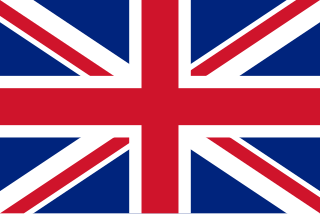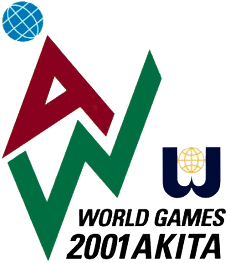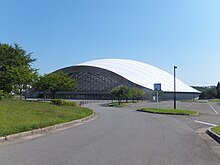
Tug of war is a sport that pits two teams against each other in a test of strength: teams pull on opposite ends of a rope, with the goal being to bring the rope a certain distance in one direction against the force of the opposing team's pull.

The World Games are an international multi-sport event comprising sports and sporting disciplines that are not contested in the Olympic Games. They are usually held every four years, one year after a Summer Olympic Games, over the course of 11 days. The World Games are governed by the International World Games Association, under the patronage of the International Olympic Committee.

The Commonwealth Games is a quadrennial international multi-sport event among athletes from the Commonwealth of Nations, which consists mostly, but not exclusively, of territories of the former British Empire. The event was first held in 1930 as the British Empire Games and, with the exception of 1942 and 1946, has successively run every four years since. The event was called the British Empire Games from 1930 to 1950, the British Empire and Commonwealth Games from 1954 to 1966, and the British Commonwealth Games from 1970 to 1974. The event removed the word British from its title for the 1978 Games and has maintained its current name ever since.

The 1900 Summer Olympics, today officially known as the Games of the II Olympiad and also known as Paris 1900, were an international multi-sport event that took place in Paris, France, from 14 May to 28 October 1900. No opening or closing ceremonies were held.

The 1908 Summer Olympics were an international multi-sport event held in London, England, from 27 April to 31 October 1908. The 1908 Games were originally scheduled to be held in Rome, but were relocated on financial grounds following the violent eruption of Mount Vesuvius in 1906, which claimed over 100 lives; Rome eventually hosted the Games in 1960.

Rugby sevens is a variant of rugby union in which teams are made up of seven players playing seven-minute halves, instead of the usual 15 players playing 40-minute halves. Rugby sevens is administered by World Rugby, the body responsible for rugby union worldwide. The game is popular at all levels, with amateur and club tournaments generally held in the summer months. Sevens is one of the most well distributed forms of rugby, and is popular in parts of Africa, Asia, Europe, and the Americas, and especially in the South Pacific.

Rugby union has been a men's medal sport at the modern Summer Olympic Games, being played at four of the first seven competitions. The sport debuted at the 1900 Paris games where the gold medal was won by the host nation. It was subsequently featured at the London games in 1908, the Antwerp games in 1920 and the Paris games in 1924.

Sport holds the central place in British culture, and the United Kingdom has played a key role in both the development and global spread of many sports. In the early stages of organized sport, the Home Nations were instrumental in establishing formal rules and forming some of the earliest governing bodies, national teams, and domestic league competitions.

The United Kingdom national football team are a football team that represents the United Kingdom. Despite football being the most popular sport in the country, the team has not played since 1965, as separate teams represent each home nation in all major international football tournaments such as the FIFA World Cup and UEFA European Championship, as well as various friendlies. It is the home nations which are FIFA affiliated and not the United Kingdom as a whole.

France was the host of the 1900 Summer Olympics in Paris. France was one of many nations that had competed in the 1896 Summer Olympics in Greece and had returned to compete at the 1900 Games.

The United Kingdom has been represented at every modern Olympic Games. By end of the 2024 Summer Olympics, it is third in the all-time Summer Olympic medal table by overall number of medals, and fourth in number of gold medals won. London hosted the Summer Olympic Games in 1908, 1948 and 2012.

Sport plays a central role in Scottish culture. The temperate, oceanic climate has played a key part in the evolution of sport in Scotland, with all-weather sports like association football and golf dominating the national sporting consciousness. However, many other sports are played in the country, with popularity varying between sports and between regions.

Great Britain, represented by the British Olympic Association (BOA), competed as the host nation of the 1908 Summer Olympics in London. The British Olympic Association was the National Olympic Committee responsible for organising the United Kingdom's representation. At the time British athletes competed under the team name "United Kingdom". The British team comprised 676 competitors.

Great Britain, represented by the British Olympic Association (BOA), competed at the 1912 Summer Olympics in Stockholm, Sweden. 274 competitors, 264 men and 10 women, took part in 79 events in 16 sports. British athletes won ten gold medals and 41 medals overall, finishing third.

Great Britain, represented by the British Olympic Association (BOA), competed at the 1920 Summer Olympics in Antwerp, Belgium. 234 competitors, 218 men and 16 women, took part in 84 events in 21 sports. British athletes won fourteen gold medals and 43 medals overall, finishing third. It would be the last Olympic Games in which Irish athletes participated for Great Britain, after foundation of Irish Free State in 1922.

The 2001 World Games, the sixth World Games, were an international multi-sport event held in Akita, Japan.

Great Britain competed at the 2008 Summer Olympics in Beijing, China. The United Kingdom was represented by the British Olympic Association (BOA), and the team of selected athletes was officially known as Team GB. Britain is one of only five NOCs to have competed in every modern Summer Olympic Games since 1896. The delegation of 547 people included 311 competitors – 168 men, 143 women – and 236 officials. The team was made up of athletes from the whole United Kingdom including Northern Ireland. Additionally some British overseas territories compete separately from Britain in Olympic competition.
This is the all-time medal table of the World Games as of the 2022 edition. In the history of the games, Russia has led the total medal count four times, and Italy three times. The United States have claimed that honor twice, while Germany also led the overall count twice in 1993 and in 2022. Ranked by gold, then silver, then bronze:

The Great Britain men's national rugby sevens team is the men's international rugby 7s team that is the representative team of Great Britain. The team competes in the annual World Rugby Sevens Series as well as the Olympic Games and European Games. Historically, Great Britain was represented in rugby 7s by England, Scotland and Wales but the inclusion of Rugby 7s at the Olympic and European Games, together with funding issues has resulted in the formation of a permanent combined team from 2023. The separate England, Scotland and Wales teams play in the Rugby World Cup Sevens and the Commonwealth Games.

The Great Britain national rugby sevens team is the women's Olympic representative team of Great Britain at the rugby sevens tournament at the Summer Olympic Games. The team played their first competitive match at the 2016 Summer Olympics after England finished in an Olympic qualifying place at the World Rugby Women's Sevens Series.












